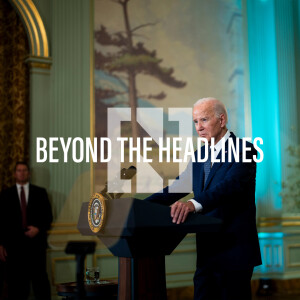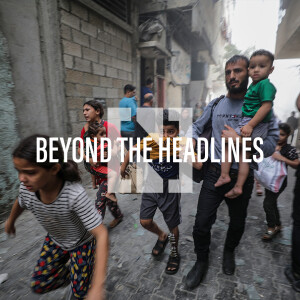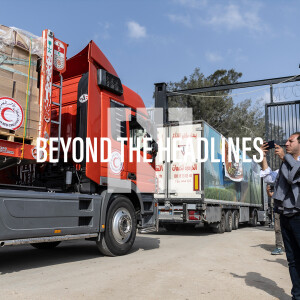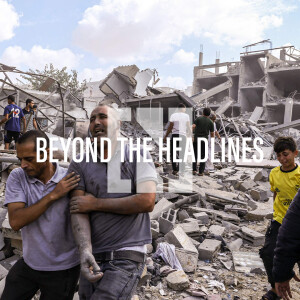
211.1K
Downloads
477
Episodes
Dive deeper into the week’s biggest stories from the Middle East and around the world with The National’s multi-award-winning podcast, Beyond the Headlines — winner of two Signal Awards and the New York Festivals Radio and TV Awards. Nuances are often missed in day-to-day headlines. We go Beyond the Headlines by bringing together the voices of experts and those living the news to provide a clearer picture of the region’s shifting political and social landscape.
Dive deeper into the week’s biggest stories from the Middle East and around the world with The National’s multi-award-winning podcast, Beyond the Headlines — winner of two Signal Awards and the New York Festivals Radio and TV Awards. Nuances are often missed in day-to-day headlines. We go Beyond the Headlines by bringing together the voices of experts and those living the news to provide a clearer picture of the region’s shifting political and social landscape.
Episodes

Monday Nov 20, 2023
The Israel-Gaza conflict and the US’s position in the Middle East
Monday Nov 20, 2023
Monday Nov 20, 2023
For decades, the relationship between the United States and Arab countries has been complex and multifaceted, and defined by a combination of geopolitical interests, economic ties and regional conflicts.
This often-fraught relationship has been affected by many factors, including the Arab-Israeli conflict, regional power dynamics and US military interventions.
With the current war between Israel and Hamas in Gaza, US President Joe Biden faces domestic and global calls to pressure one of its most important allies to agree to a ceasefire with the militant group. Mr Biden's administration has not been open to the option - despite the growing civilian death toll - something governments in the Middle East have repeatedly called for.
This week on Beyond the Headlines, host Ismaeel Naar is joined by Brian Katulis, vice president of policy at the Middle East Institute, to explain how Israel’s war on Gaza affected the US’s position in the region.

Friday Nov 17, 2023
Hamas, Israel, and where the war goes from here
Friday Nov 17, 2023
Friday Nov 17, 2023
We’re almost six weeks into the Israel-Gaza war and few believe it will end any time soon. Calls for ceasefires from the international community have fallen on deaf ears and hostage release negotiations are proving fruitless. But end at some point, it must.
And when it does, what will peace look like – for Gaza, for Hamas, for Israel?
This week on Beyond the Headlines, host Nada AlTaher is joined by Hussein Ibish, senior resident scholar at the Arab Gulf States Institute and a US affairs columnist for The National, to talk about the current conflict - and what lies ahead.

Friday Nov 10, 2023
How is the Israel-Gaza war seen from a US viewpoint?
Friday Nov 10, 2023
Friday Nov 10, 2023
The US is feeling the pressure of the war in Gaza because of the way President Joe Biden is deemed to be handling the conflict.
In the days after the October 7 Hamas attacks, Mr Biden visited Israel and expressed his staunch support for the country.
But as civilian casualties rise in Gaza, the Biden administration has begun to call for temporary pauses in hostilities and for more humanitarian aid to be allowed into the enclave, although it has, so far, rejected calls for a ceasefire.
Thousands of protesters held a rally in solidarity with Palestinians in Gaza earlier this week amid a background of rising public anger towards policymakers.
In this episode of Beyond The Headlines, host Thomas Watkins, The National’s Washington bureau chief, examines the Gaza conflict from the US perspective.

Tuesday Nov 07, 2023
A month into the Israel-Gaza war, what happened so far?
Tuesday Nov 07, 2023
Tuesday Nov 07, 2023
A month ago, the military wing of Hamas attacked the Israeli border on October 7th, killing more than 1,400 Israelis and igniting a brutal war.
Israel retaliated through a relentless bombing of Gaza and its people, saying Hamas militants were its only targets. However, the civilian death toll has passed 10,000.
A mass attack by Israeli armoured divisions was predicted as a response. However, Prime Minister Benjamin Netanyahu's government appears to be preparing for a long war. Officials say it could last from four to six months, but analysts say it could stretch for a year.
On this episode of Beyond the Headlines, host Thomas Harding looks at how effective the Israeli offensive has been against Hamas so far.

Friday Nov 03, 2023
Gaza’s human battle and what is expected from Hamas
Friday Nov 03, 2023
Friday Nov 03, 2023
Life in Gaza has been nothing but harrowing for a month now.
Fighting between Hamas and the Israeli military has intensified, with Israel saying the war has now entered its second phase, as its army surrounds Gaza.
But civilians are still paying the highest cost of this war. More than 9,000 people have been killed in Gaza, including more than 3,600 children, since October 7, which has seen an attack from Hamas that killed more than 1,400 in Israel.
People in Gaza are facing non-stop bombardment. Those who have lived through war after war are saying this is the worst they’ve ever seen.
This week on Beyond the Headlines, host Nada AlTaher takes a closer look at the condition of hospitals in Gaza by speaking to one of the doctors on the front line. We also explore how Gaza reached this point and what is expected of Hamas with the war entering its second phase.

Friday Oct 27, 2023
Is Hezbollah a third player in the Israel-Gaza war?
Friday Oct 27, 2023
Friday Oct 27, 2023
There is a whiff of war in Lebanon. Haunted by memories of previous conflicts, many Lebanese are worried about a major escalation, and preparing for the worst.
Families have packed emergency bags in case they need to suddenly be evacuated. People have begun stockpiling medicine and water. In Tyre, the urban soundscape is occasionally interrupted by the sound of bombardment coming from the frontier. And elsewhere in southern Lebanon, which shares a border with Israel, some towns are deserted.
The border has been the site of a so far contained conflict between the Lebanese militant group Hezbollah and Israel – with nevertheless dozens of fatalities - in a splinter of the broader Israel-Gaza war.
On this episode of Beyond the Headlines, host Nada Homsi from The National’s Beirut bureau asks how Lebanon’s Hezbollah is involved in the current conflict - and where it could go from here.

Monday Oct 23, 2023
Egypt’s dilemma as war rages between Israel and Gaza
Monday Oct 23, 2023
Monday Oct 23, 2023
The world’s attention has turned to a corner of the Sinai region of Egypt.
The location is the Rafah Crossing, where for days lorries laden with aid have queued to enter the Palestinian territory from Egypt. On the other side of the crossing, Palestinians and dual nationals trapped in Gaza wait under Israeli rocket fire in the hope of being able to leave.
But Egypt finds itself in an impossible situation – should it offer civilians from Gaza a safe route out of the territory and welcome them as refugees? Or should it keep its border closed and leave 2.3 million people at the mercy of Israel’s retaliation for Hamas’s attack on October 7.
In this week’s Beyond the Headlines, host Ismaeel Naar talks to The National’s Cairo correspondent, Hamza Hendawi, about the predicament facing Egypt.

Thursday Oct 19, 2023
What are the chances of the Israel-Gaza conflict becoming a Middle East war?
Thursday Oct 19, 2023
Thursday Oct 19, 2023
In September, Israel’s Prime Minister Benjamin Netanyahu stood in front of world leaders at the UN General Assembly and displayed two maps: one showing Israel’s isolation at the time of its creation in 1948, and another showing the Arab countries that have normalised relations with it. He referred to a “new Middle East”.
That came amid US-led talks aimed at Israel and Saudi Arabia establishing formal ties.
But today, as we record on October 18, we’re in a different reality. The Israel-Gaza war has created a dangerous potential turning point for the region - and the world - putting peace on the back burner.
On this episode of Beyond the Headlines, host Sulaiman Hakemy asks whether the Israel-Gaza war is the start of something much bigger – and even worse.

Tuesday Oct 17, 2023
Bombed, displaced, deprived - Gaza’s humanitarian catastrophe
Tuesday Oct 17, 2023
Tuesday Oct 17, 2023
The world is now witnessing a humanitarian crisis in Gaza. Thousands of residents have been killed or injured by 10 days of airstrikes. Hospitals and medical facilities are struggling to operate, and the enclave has no access to food, fuel, electricity or a clean water supply.
Ambulances and lorries full of humanitarian supplies are currently queuing on the Egyptian border with Gaza, waiting for a ceasefire to allow them in.
This is happening while hundreds of thousands of families have been internally displaced from northern Gaza to the south of the strip after an Israeli evacuation order. They are still struggling with the continued bombardment of airstrikes and often have nowhere to stay.
In this episode of Beyond The Headlines, host Nada AlTaher looks at the humanitarian crisis gripping Gaza.

Friday Oct 13, 2023
What is Israel’s end goal with its war on Gaza?
Friday Oct 13, 2023
Friday Oct 13, 2023
Israel was taken by surprise a week ago when Hamas stormed across its border. The surprise attack has had huge ramifications in the Middle East and for the world.
Leaders in western countries have backed Israel and said that the country has ‘’the right to defend itself’’ as it goes after Hamas with a bombing campaign in densely populated Gaza.
This week on Beyond the Headlines, host Ismaeel Naar speaks to officials and analysts about the Israeli response and what have been described as “failures” of the government ahead of the Hamas attack. They also discuss the subsequent diplomatic efforts since the attack on the morning of October 7 – and what could come next.
